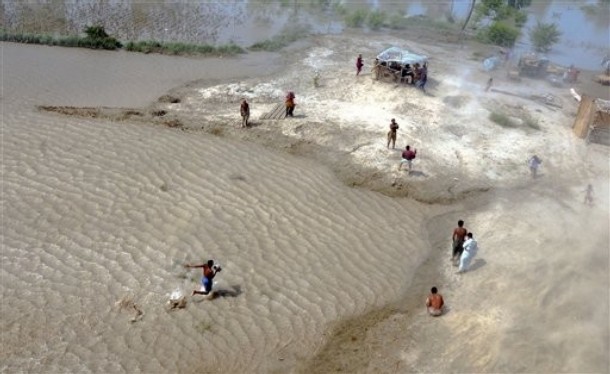
The fierce flooding in northwest Pakistan is a catastrophe that’s killed more than 1,000 people, left thousands homeless and millions more in desperate need of aid. Does the disaster also create an opportunity for Pakistan and the United States to win hearts and minds with food and assistance? NPR’s Scott Simon talks with Shuja Nawaz, director of the South Asia Center at the Atlantic Council.
SCOTT SIMON, host:
The fierce flooding in northwest Pakistan is a catastrophe that’s killed more than 1,000 people, left thousands more homeless and hungry, and millions in desperate need of aid. The floods have struck an area that’s also been a battleground between the government of Pakistan and the Taliban. Does this disaster also create an opportunity for Pakistan and the United States to win hearts and minds with food and assistance?
In an op-ed piece in the Washington Post this week, Shuja Nawaz, director of the South Asia Center at the Atlantic Council, writes about the chances of building trust in Pakistan. Mr. Nawaz joins us in our studio. Thanks so much for being with us.
Mr. SHUJA NAWAZ (South Asia Center, Atlantic Council): Thank you, Scott.
SIMON: Tell us about what you see as a window of opportunity.
Mr. NAWAZ: Well, first I see the tragedy, which is the worst in Pakistan’s history and the worst since the last 80 years. But I also see an opportunity because the United States and Pakistan have been on and off allies over the years, and there is still a level of distrust between them that is still deep. And perhaps when Pakistanis see the United States actually on the ground helping ordinary people, there will be the grounds for removing this distrust.
SIMON: You write that the sight of U.S. helicopters, which might alarm some people, is now reassuring in Pakistan.
Mr. NAWAZ: Absolutely. And this harkens back to the U.S. assistance during the 2005 earthquake when the same type of helicopters, the Chinooks, were being referred to as angels of mercy. And they see Americans doling out this assistance, standing side by side with Pakistani soldiers. I think that means a lot to the ordinary people.
SIMON: Recent opinion polls have been cited, a lot in both countries, that show almost 60 percent of the Pakistani public considers the U.S. to be some kind of adversary. But in this welter of polls you have noticed another statistic.
Mr. NAWAZ: Yes. Something like 64 percent of the Pakistanis polled by the Pew Global Attitude survey that was released recently indicates that 64 percent of the people polled actually want to improve relations with the United States. I see that as an opportunity. Not just for the United States but for Pakistan too, because Pakistan needs to be a member of the polity of nations, working with states like the United States and other trading partners.
And if it can build on this kind of collaborative arrangement, rather than simply a kind of patron-client relationship, which has been the characteristic in the past, then perhaps there is some hope.
SIMON: Now, we have also read that the Taliban has been trying to be of assistance.
Mr. NAWAZ: Not the Taliban so much as the Panjabi military groups that are allies of the Taliban. They have been very active through their social services groups. They were active in the earthquake zone too, and in fact in many cases worked in the same areas that the U.S. was providing assistance – very ironic.
They have been active, and that’s largely because the government, unfortunately, has been very inept and slow. And when government creates a vacuum, then these groups fill it with social services. So I think this is a warning for the government now that particularly as the aid starts flowing into Pakistan, the government had better get its act together and the government better show its face on a regular basis and not the kind of sporadic hit and run, which government leaders have been doing.
I mean, it was very sad and noticeable that the president of Pakistan was out of the country.
SIMON: He was in London.
Mr. NAWAZ: He was in France and then in the U.K. throughout the period that the flood sort of ravaging his country, came back and went for essentially a photo op into one province in Sinth(ph).
So while these meetings may be important, I think the people would want to see their leaders share their misery in the sense that they can see what the people are going through and see what the government is trying to do to help.
SIMON: Shuja Nawaz is the author of "Pakistan in the Danger Zone: A Tenuous U.S.-Pakistan Relationship." Thanks so much for being with us.
Mr. NAWAZ: My pleasure.
Shuja Nawaz is director of the South Asia Center at the Atlantic Council. This is the transcript of a conversation broadcast on NPR Weekend Edition – Saturday. Photo credit: AP.
The audio version of the conversation appears below.
This article is part of the series Pakistan Floods: Hope from Tragedy. To find a series description and links to related posts, please click here.
Image: Pakistan%20floods%202.jpg
